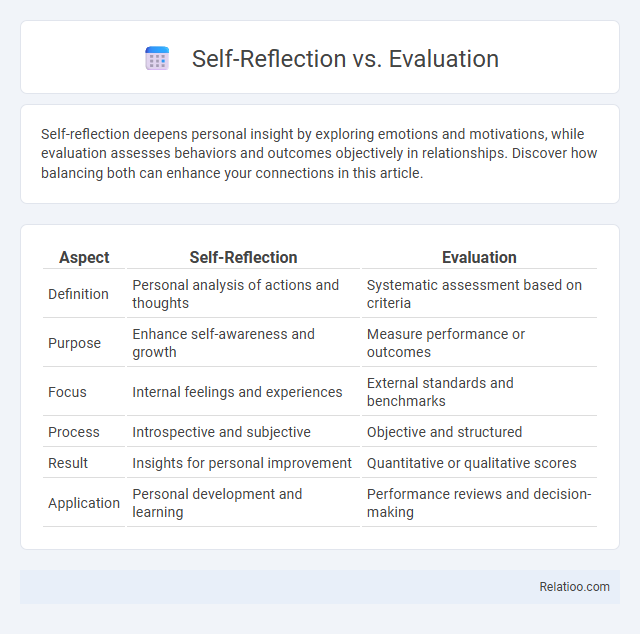Self-reflection deepens personal insight by exploring emotions and motivations, while evaluation assesses behaviors and outcomes objectively in relationships. Discover how balancing both can enhance your connections in this article.
Table of Comparison
| Aspect | Self-Reflection | Evaluation |
|---|---|---|
| Definition | Personal analysis of actions and thoughts | Systematic assessment based on criteria |
| Purpose | Enhance self-awareness and growth | Measure performance or outcomes |
| Focus | Internal feelings and experiences | External standards and benchmarks |
| Process | Introspective and subjective | Objective and structured |
| Result | Insights for personal improvement | Quantitative or qualitative scores |
| Application | Personal development and learning | Performance reviews and decision-making |
Understanding Self-Reflection: A Personal Insight
Self-reflection involves a deep, personal insight into your thoughts, emotions, and behaviors, fostering self-awareness and growth. Evaluation typically assesses performance or outcomes based on external criteria, while self-reflection centers on internal understanding and meaning-making. Your ability to engage in self-reflection enhances emotional intelligence and supports continuous personal development.
What is Evaluation? Purpose and Principles
Evaluation is a systematic process of assessing the effectiveness, value, or quality of a program, product, or performance based on predefined criteria and standards. Its primary purpose is to provide objective feedback that informs decision-making, improvement strategies, and accountability measures. Evaluation principles emphasize clarity, fairness, accuracy, and relevance to ensure that Your assessments yield actionable and trustworthy results.
Key Differences Between Self-Reflection and Evaluation
Self-reflection involves introspective analysis of personal thoughts, feelings, and experiences to foster self-awareness and growth, emphasizing subjective insight. Evaluation is an objective assessment based on predetermined criteria or standards, often used to measure performance or outcomes externally. Key differences include self-reflection's internal, qualitative focus versus evaluation's external, quantitative approach, where self-reflection prioritizes personal development and evaluation emphasizes performance measurement.
The Role of Self-Reflection in Personal Growth
Self-reflection plays a critical role in personal growth by enabling you to deeply analyze your thoughts, actions, and experiences to gain meaningful insights. Unlike evaluation, which often involves judgment based on external criteria, self-reflection fosters awareness and understanding of inner motivations and patterns. This introspective process supports continuous improvement and emotional intelligence, key factors in developing resilience and achieving long-term success.
Evaluation: Tools for Measuring Progress
Evaluation employs precise tools such as performance metrics, surveys, and analytics to measure your progress objectively, offering quantifiable data that informs decision-making. Unlike self-reflection, which relies on subjective insights, evaluation provides structured feedback through standardized assessments, ensuring consistency and reliability in tracking development. Combining both approaches enhances personal growth by balancing introspective understanding with empirical evidence.
Benefits of Practicing Regular Self-Reflection
Practicing regular self-reflection enhances emotional intelligence by fostering greater self-awareness and insight into personal behaviors, which accelerates professional and personal growth. Unlike evaluation, which often involves external criteria and judgment, self-reflection is an introspective process that promotes mindfulness and continuous improvement. This habit strengthens decision-making skills, increases resilience, and supports goal alignment by encouraging honest assessment of experiences and values.
Advantages of Evaluation in Professional Settings
Evaluation in professional settings offers clear, objective criteria to measure performance, enabling you to identify strengths and areas for improvement with precision. It facilitates accountability by providing documented feedback based on measurable outcomes, which supports career development and organizational goals. Unlike self-reflection, evaluation incorporates external perspectives, enhancing fairness and reducing personal biases in assessing competence.
Combining Self-Reflection and Evaluation for Success
Combining self-reflection and evaluation enhances personal and professional growth by integrating introspective insights with objective performance metrics. Self-reflection involves analyzing one's thoughts, emotions, and behaviors to foster awareness, while evaluation assesses results against predetermined criteria to measure effectiveness. This synergy promotes continuous improvement, enabling individuals to identify strengths, address weaknesses, and align goals with actionable outcomes for sustained success.
Common Challenges: Self-Reflection vs Evaluation
Common challenges in self-reflection versus evaluation include distinguishing personal insights from external judgments and managing emotional biases that affect objective assessment. You may struggle to balance honest self-awareness with critical feedback from others, which can lead to confusion between growth opportunities and performance appraisals. Overcoming these challenges requires clarity in purpose and consistent practice in separating subjective thoughts from evaluative criteria.
Tips to Balance Reflection and Evaluation Effectively
Balancing self-reflection and evaluation effectively requires setting clear objectives for both processes to avoid bias and maintain objectivity. You should allocate specific time for introspective self-reflection to uncover personal insights, while using structured evaluation methods to measure progress against goals objectively. Incorporating feedback from external sources enhances accuracy and promotes continuous improvement in your development journey.

Infographic: Self-reflection vs Evaluation
 relatioo.com
relatioo.com